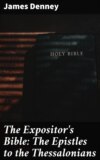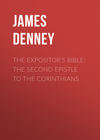Kitabı oku: «The Expositor's Bible: The Epistles to the Thessalonians», sayfa 9
Bir şeyler ters gitti, lütfen daha sonra tekrar deneyin
Türler ve etiketler
Yaş sınırı:
12+Litres'teki yayın tarihi:
11 ağustos 2017Hacim:
300 s. 1 illüstrasyonTelif hakkı:
Public Domain





